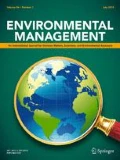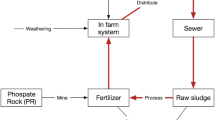Abstract
Ecotechnologies have the potential to reduce the use of finite resources while providing a variety of co-benefits to society, though they often lack in market competitiveness. In this study, we investigate the sustainability of ecotechnologies for recovering carbon and nutrients, and demonstrate how a so-called “bottom-up” approach can serve as a decision-making instrument. Based on three case study catchments with a focus on domestic wastewater in Sweden and Poland, and on manure, grass and blackwater substrates in Finland, we apply a cost–benefit analysis (CBA) on system alternatives derived from a participatory process. After drawing on an initial systematic mapping of relevant ecotechnologies, the scope of the CBA is determined by stakeholder suggestions, namely in terms of the considered assessment criteria, the physical impacts and the utilised data. Thus, this CBA is rooted in a localised consideration of ecotechnologies rather than a centralised governmental approach to systems boundaries. The key advantage of applying such a bottom-up approach is that it has gone through a robust participatory selection process by local stakeholders, which provides more legitimacy to the decisions reached compared with traditional feasibility studies. Despite considering the revenues of the recovered products as well as the provision of the non-market goods CO2 mitigation and reduced eutrophication, findings from this study indicate that the benefits of the considered ecotechnologies are often outweighed by their costs. Only anaerobic digestion of agricultural wastes appears to be economically feasible under the current conditions, highlighting that further efforts and incentives may be required to mainstream ecotechnologies.



Similar content being viewed by others
References
Achat DL, Daumer ML, Sperandio M, Santellani AC, Morel C (2014a) Solubility and mobility of phosphorus recycled from dairy effluents and pig manures in incubated soils with different characteristics. Nutrient Cycl Agroecosystems 99(1):1–15. https://doi.org/10.1007/s10705-014-9614-0
Achat DL, Sperandio M, Daumer ML, Santellani AC, Prud’Homme L, Akhtar M, Morel C (2014b) Plant-availability of phosphorus recycled from pig manures and dairy effluents as assessed by isotopic labeling techniques. Geoderma 232–234:24–33. https://doi.org/10.1016/j.geoderma.2014.04.028
Adlert MD, Posner EA (1999) Articles rethinking cost-benefit analysis. Yale Law J 109(2):165–247. https://www.jstor.org/stable/797489
Andersen JH, Carstensen J, Conley DJ, Dromph K, Fleming-Lehtinen V, Gustafsson BG, Josefson AB, Norkko A, Villnäs A, Murray C (2017) Long-term temporal and spatial trends in eutrophication status of the Baltic Sea. Biol Rev 92(1):135–149. https://doi.org/10.1111/brv.12221
Arrow KJ, Cropper ML, Gollier C, Groom B, Heal GM, Newell RG, Nordhaus WD, Pindyck RS, Pizer WA, Portney PR, Sterner T, Tol RSJ, Weitzman ML (2014) Should governments use a declining discount rate in project analysis? Rev Environ Econ Policy 8(2):145–163. https://doi.org/10.1093/reep/reu008
Barquet K, Järnberg L, Rosemarin A, Macura B (2020) Identifying barriers and opportunities for a circular phosphorus economy in the Baltic Sea region. Water Res 171:115433. https://doi.org/10.1016/j.watres.2019.115433
Bellarby J, Foereid B, Hastings AFSJ, Smith P (2008) Cool farming: climate impacts of agriculture and mitigation potential. Greenpeace International, Amsterdam, Netherlands, p. 44. https://www.greenpeace.org/usa/wp-content/uploads/legacy/Global/usa/report/2009/4/cool-farming-climateimpacts.pdf
De Bruyn S, Korteland M, Markowska A, Davidson M, de Jong F, Bles M, Sevenster M (2010) Shadow prices handbook valuation and weighting of emissions and environmental impacts (Issue March), CE Delft, Holland. http://www.ce.nl/?go=home.downloadPub&id=1032&file=7788_defMainReportMaKMV_1271765427.pdf
Bruyn S, Ahdour S, Bijleveld M, de Graaff L, Schep E, Schroten A, Vergeer R (2017) Environmental prices handbook, CE Delft, Holland 2017
Bruyn S, Bijleveld M, de Graaff L, Schep E, Schroten A, Vergeer R, Saliha A (2018) Environmental prices handbook EU28 version: methods and numbers for valuation of environmental impacts, Delft, Holland
Carolus J, Hanley N, Olsen SB, Pedersen SM (2018) A bottom-up approach to environmental cost-benefit analysis. Ecol Econ 152:282–295. https://doi.org/10.1016/j.ecolecon.2018.06.009
Cieślik B, Konieczka P (2017) A review of phosphorus recovery methods at various steps of wastewater treatment and sewage sludge management. The concept of “no solid waste generation” and analytical methods. J Clean Prod 142:1728–1740. https://doi.org/10.1016/j.jclepro.2016.11.116
Czajkowski M, Ahtiainen H, Artell J, Budziński W, Hasler B, Hasselström L, Meyerhoff J, Nõmmann T, Semeniene D, Söderqvist T, Tuhkanen H, Lankia T, Vanags A, Zandersen M, Zylicz T, Hanley N (2015) Valuing the commons: an international study on the recreational benefits of the Baltic Sea. J Environ Manag 156:209–217. https://doi.org/10.1016/j.jenvman.2015.03.038
Danish Climate Council (2020) Kendte veje og nye spor til 70 procents reduktion [in English:Known ways and new tracks for a 70% reduction], Danish Climate Council, Copenhagen, p. 154
EEA (2018) Nutrients in freshwater (CSI 020). http://www.eea.europa.eu/data-and-maps/indicators/nutrients-in-freshwater/nutrients-in-freshwater-assessment-published-6
Ellen MacArthur Foundation (2015) Towards a circular economy: business rationale for an accelerated transition. Ellen MacArthur Foundation (EMF), p 20.
Ellen MacArthur Foundation (2019). How the circular economy tackles climate change. Ellen MacArthur Foundation, September, p. 1–62
European Commission (2008) Guide to cost benefits analysis of investment projects. https://doi.org/10.11646/zootaxa.1910.1.6
European Commission (2014) Guide to cost-benefit analysis of investment projects. https://doi.org/10.2776/97516
European Commission (2021) VAT rates applied in the member states of the European Union. https://ec.europa.eu/taxation_customs/tic/public/vatRates/vatrates.html
Fishburn PC, Rubinstein A (1982) Time preference. Int Economic Rev 23(3):677–694
Haddaway NR, Johannesdottir SL, Piniewski M, Macura B (2019) What ecotechnologies exist for recycling carbon and nutrients from domestic wastewater? A systematic map protocol. Environ Evid 8(1):1. https://doi.org/10.1186/s13750-018-0145-z
Haddaway NR, McConville J, Piniewski M (2018) How is the term ‘ecotechnology’ used in the research literature? A systematic review with thematic synthesis. Ecohydrol Hydrobiol 18(3):247–261. https://doi.org/10.1016/j.ecohyd.2018.06.008
Hanley N, Barbier E (2009) Pricing nature: cost-benefit analysis and environmental policy. Edward Elgar, Cheltenham
Hanserud OS, Cherubini F, Øgaard AF, Müller DB, Brattebø H (2018) Choice of mineral fertilizer substitution principle strongly influences LCA environmental benefits of nutrient cycling in the agri-food system. Sci Total Environ 615:219–227. https://doi.org/10.1016/j.scitotenv.2017.09.215
HELCOM (2017) State of the Baltic Sea—Second HELCOM holistic assessment, 2011–2016. In Baltic Sea Environment Proceedings (Vol. 155). https://doi.org/10.1016/j.gaitpost.2008.05.016
Jenssen TK, Kondshaug G (2004) Energy consumption and greenhouse gas emissions in fertiliser production—International Fertiliser Society. https://fertiliser-society.org/store/energy-consumption-and-greenhouse-gas-emissions-in-fertiliser-production/
Johannesdottir S, Kärrman E, Ljung E, Anderzén C, Edström M, Ahlgren S, Englund M (2019) BONUS RETURN reducing emissions by turning nutrients and carbon into benefits. Deliverable No: D.3.3. In D.3.3—Report from the multi-criteria analysis from workshop 2 with comparisons of the different alternatives in each case study and selection of eco- technologies for further use in WP5
Johannesdottir S, Kärrman E, Barquet K, Koskiaho J, Olsson O, Giełczewskie M (2021) Sustainability assessment of technologies for resource recovery in two Baltic Sea Region case-studies using multi-criteria analysis. Clean Environ Syst 2:100030
Johnston RJ, Rolfe J, Rosenberger RS, Brouwer R (2015). The economics of non-market good and resources: benefit transfer of environmental and resource values—a guide for researchers and practitioners. Springer. https://www.springer.com/gp/book/978940179929410
Johnston RJ, Rolfe J, Zawojska E (2018) Benefit transfer of environmental and resource values: progress, prospects and challenges. Int Rev Environ Resour Econ 12(2–3):177–266. https://doi.org/10.1561/101.00000102
Kidd PS, Domínguez-Rodríguez MJ, Díez J, Monterroso C (2007) Bioavailability and plant accumulation of heavy metals and phosphorus in agricultural soils amended by long-term application of sewage sludge. Chemosphere 66(8):1458–1467. https://doi.org/10.1016/j.chemosphere.2006.09.007
Kool A, Marinussen M, Blonk H (2012) LCI data for the calculation tool Feedprint for greenhouse gas emissions of feed production and utilization, Blonk Consultants, Holland, p. 20
Koppelaar RHEM, Weikard HP (2013) Assessing phosphate rock depletion and phosphorus recycling options. Glob Environ Change 23(6):1454–1466. https://doi.org/10.1016/j.gloenvcha.2013.09.002
Koskiaho J, Okruszko T, Piniewski M, Marcinkowski P, Tattari S, Johannesdottir S, Kärrman E, Kämäri M (2020) Carbon and nutrient recycling ecotechnologies in three Baltic Sea river basins-the effectiveness in nutrient load reduction Ecohydrol Hydrobiol 20:313–322
Kuik O, Brander L, Nikitina N, Navrud S, Magnussen K, Fall EH (2007) Energy-related external costs due to land use changes, acidification and eutrophication, visual intrusion and climate change. Cases – Costs assessment for sustainable energy markets project no 518294 SES6 – deliverable D.3.2, Institute for Environmental Studies, VU University Amsterdam, Holland
Layard R, Nickell S, Mayraz G (2008) The marginal utility of income. J Public Econ 92(8–9):1846–1857. https://doi.org/10.1016/j.jpubeco.2008.01.007
Lennartsson M, McConville J, Kvarnström E, Hagman M, Kjerstadius H (2019) Investments in innovative urban sanitation—decision-making processes in Sweden. Water Altern 12(2):588–608
Li Q, Guo XY, Xu XH, Zuo YB, Wei DP, Ma YB (2012) Phytoavailability of copper, zinc and cadmium in sewage sludge-amended calcareous soils. Pedosphere 22(2):254–262. https://doi.org/10.1016/S1002-0160(12)60012-5
Linderholm K, Tillman AM, Mattsson JE (2012) Life cycle assessment of phosphorus alternatives for Swedish agriculture. Resources, Conservation and Recycling 66:27–39. https://doi.org/10.1016/j.resconrec.2012.04.006
Lorick D, Macura B, Ahlström M, Grimvall A, Harder R (2020) Effectiveness of struvite precipitation and ammonia stripping for recovery of phosphorus and nitrogen from anaerobic digestate: a systematic review. Environ Evid 9(1):1–20. https://doi.org/10.1186/s13750-020-00211-x
Macura B, Johannesdottir SL, Piniewski M, Haddaway NR, Kvarnström E (2019a) Effectiveness of ecotechnologies for recovery of nitrogen and phosphorus from anaerobic digestate and effectiveness of the recovery products as fertilisers: a systematic review protocol. Environ Evid 8(1):29. https://doi.org/10.1186/s13750-019-0173-3
Macura B, Piniewski M, Ksiȩżniak M, Osuch P, Haddaway NR, Ek F, Andersson K, Tattari S (2019b) Effectiveness of ecotechnologies in agriculture for the recovery and reuse of carbon and nutrients in the Baltic and boreo-temperate regions: a systematic map. Environ Evid 8(1). https://doi.org/10.1186/s13750-019-0183-1
Mayrhofer JP, Gupta J (2016) The science and politics of co-benefits in climate policy. Environ Sci Policy 57:22–30. https://doi.org/10.1016/j.envsci.2015.11.005
McCrackin ML, Gustafsson BG, Hong B, Howarth RW, Humborg C, Savchuk OP, Svanbäck A, Swaney DP (2018) Opportunities to reduce nutrient inputs to the Baltic Sea by improving manure use efficiency in agriculture. Regional Environ Change 18(6):1843–1854. https://doi.org/10.1007/s10113-018-1308-8
Melia PM, Cundy AB, Sohi SP, Hooda PS, Busquets R (2017) Trends in the recovery of phosphorus in bioavailable forms from wastewater. Chemosphere 186:381–395. https://doi.org/10.1016/j.chemosphere.2017.07.089
Molinos-Senante M, Hernández-Sancho F, Sala-Garrido R (2010) Economic feasibility study for wastewater treatment: a cost-benefit analysis. Sci Total Environ 408(20):4396–4402. https://doi.org/10.1016/j.scitotenv.2010.07.014
Møller F, Jensen DB (2004). Velfærdsøkonomiske forvridningsomkostninger ved finansiering af offentlige projekter (Issue 496). http://www.dmu.dk/1_viden/2_publikationer/3_fagrapporter/rapporter/FR496.PDF
OECD (2018) Cost benefit analysis and the enviroment: further developments and policy use. OECD publishing, Paris
Reta G, Dong X, Li Z, Su B, Hu X, Bo H, Yu D, Wan H, Liu J, Li Y, Xu G, Wang K, Xu S (2018) Environmental impact of phosphate mining and beneficiation: review. Int J Hydrol 2(4):424–431. https://doi.org/10.15406/ijh.2018.02.00106
Rosemarin A, Macura B, Carolus J, Barquet K, Ek F, Järnberg L, Lorick D, Johannesdottir S, Pedersen SM, Koskiaho J, Haddaway NR, Okruszko T (2020) Circular nutrient solutions for agriculture and wastewater—a review of technologies and practices. Curr Opin Environ Sustainability 45:78–91. https://doi.org/10.1016/j.cosust.2020.09.007
Roy ED (2017) Phosphorus recovery and recycling with ecological engineering: a review. Ecol Eng 98:213–227. https://doi.org/10.1016/j.ecoleng.2016.10.076
Sterner T, Barbier EB, Bateman I, van den Bijgaart I, Crépin AS, Edenhofer O, Fischer C, Habla W, Hassler J, Johansson-Stenman O, Lange A, Polasky S, Rockström J, Smith HG, Steffen W, Wagner G, Wilen JE, Alpízar F, Azar C, Robinson A (2019) Policy design for the Anthropocene. Nat Sustain 2(1):14–21. https://doi.org/10.1038/s41893-018-0194-x
Svanbäck A, McCrackin M (2016) Policy brief Stockholm Resilience Center Stockholm University, https://www.su.se/polopoly_fs/1.301618.1476346407!/menu/standard/file/PBgo%CC%88dselENGwebb.pdf
Weikard HP (2016) Phosphorus recycling and food security in the long run: a conceptual modelling approach. Food Security 8(2):405–414. https://doi.org/10.1007/s12571-016-0551-4
World Bank (2020) World Development Indicators|DataBank. World Development Indicators. https://databank.worldbank.org/reports.aspx?source=2&type=metadata&series=FP.CPI.TOTL.ZG#
Acknowledgements
This research was performed within the BONUS RETURN project. BONUS RETURN has received funding from BONUS (Art 185), funded jointly by the EU and Formas, A Swedish Research Council for Sustainable Development; Sweden’s innovation agency, Vinnova; Academy of Finland; and the National Centre for Research and Development in Poland. We thank all colleagues who contributed to the study and the project partners of the BONUS RETURN project.
Author information
Authors and Affiliations
Corresponding author
Ethics declarations
Conflict of interest
The authors declare no competing interests.
Additional information
Publisher’s note Springer Nature remains neutral with regard to jurisdictional claims in published maps and institutional affiliations.
Supplementary information
Rights and permissions
About this article
Cite this article
Callesen, G.M., Pedersen, S.M., Carolus, J. et al. Recycling Nutrients and Reducing Carbon Emissions in the Baltic Sea Region—Sustainable or Economically Infeasible?. Environmental Management 69, 213–225 (2022). https://doi.org/10.1007/s00267-021-01537-z
Received:
Accepted:
Published:
Issue Date:
DOI: https://doi.org/10.1007/s00267-021-01537-z




